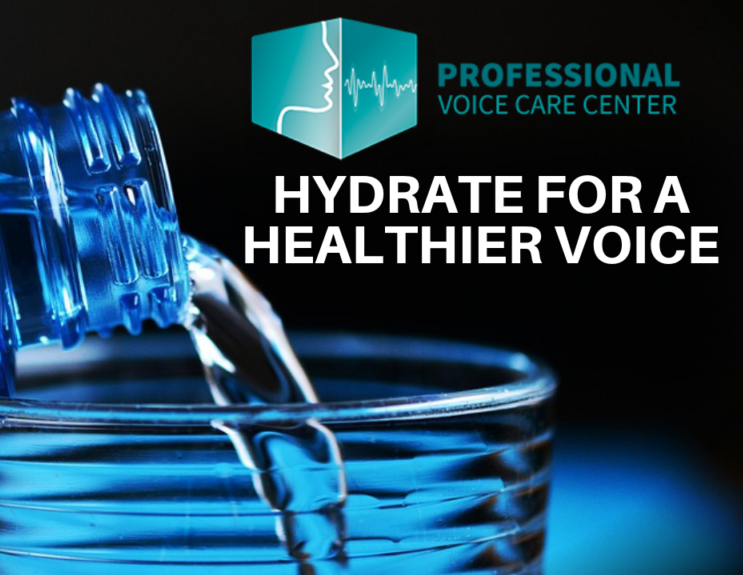Hydration – we all know it’s important for your health in general: for digestion, flushing toxins, healthy joints, for staying alert and clear-headed, etc. But why is hydration so important for your voice?
The answer is simple: vocal folds (which aren’t really skinny “vocal cords”, but rather multi-layered folds of tissue) are covered with mucous membrane, similar to the lining of your mouth. Mucous membranes need to be moist to stay healthy. Think of the mucous membrane as the “armor” that keeps your respiratory system healthy. Staying hydrated helps to make your mucus thin and watery. This thin mucus acts to lubricate the vocal folds. If the membranes dry out, it’s like a chink in the armor. Your cords can become irritated and swollen, leading to potential injury. Definitely not what we want.
Here’s a vocal bonus from hydrating well: when your vocal folds are moist, it takes less force to set them into vibration, than if they were dry. You can work less and get more (voice) out of it! Conversely, if the vocal folds are dry, you have to use more effort to sing or speak. I know I don’t want to work that hard!
Now, I’ve heard this complaint before: “I have soooo much mucus! I wish I could get rid of it.” In reality, you don’t. Mucus is your friend, kind of. It provides lubrication and protection, like oil protects an engine, but only if it’s thin. If you’re not well-hydrated, the mucus can get thick and sticky, which makes you think you have a lot of it. Then the typical reaction is that horrible forceful throat-clearing that we’ve all been guilty of. And forceful throat-clearing can injure your vocal folds. (More about throat-clearing in a future blog).
Yup, hydration is obviously important, but do we really know how to stay well-hydrated? There are so many different recommendations for how much we should be drinking, and what we should be drinking. Let’s talk about the good, the bad, and the effective! And for those who complain about the obvious and sometimes inconvenient side effect of drinking a lot of water, and there are many of you I’m sure, we can even help you out a bit.
So, let’s talk about what to drink. Easy: WATER!! As they say, only water is water. How much should we drink? A good rule of thumb is to drink half your body weight in ounces of water unless there’s a medical reason why you’re not allowed to do so. Plan on having more water if you’re active if you dance or work out, if you’re rehearsing under hot lights, or if you work outdoors in the heat. Another way to remember this: “Pee Pale”, or as we say in our office, “Pee White, Sing (Speak) Right”.
If you drink alcohol or caffeinated beverages like coffee, tea, or cola, those will cause you to lose water, as they act as diuretics. So plan on replacing that lost fluid with at least an additional cup of water for every caffeinated or alcoholic beverage you drink.
Other factors that may dry out your vocal folds: antihistamines and decongestants, exposure to smoke or fumes, and dry heat or air conditioning in our homes and offices. Speaking of dry homes, use a vaporizer or humidifier overnight, and be sure to keep it clean following the manufacturer’s instructions.
As promised, for you guys and gals who feel like you’re always running to the bathroom after you drink water, here’s another way to hydrate your vocal folds: steam inhalation. We have another blog devoted to this method of instant direct hydration (remember water that you drink has to go through your digestive system before it reaches your vocal folds; inhaling steam puts that moisture onto your vocal membranes immediately, like “breathing” a glass of water). See our steaming blog/video here.) Of course, tapering off your fluids close to bedtime or when you’re on the road is another option. Just drink more during the day, or when you reach your destination.
I’m sure you now agree that being aware of hydration every day is important, but you might be thinking: do I really have to keep track of how much water I consume? And the answer is…YES!! Here are some suggestions to make this an easy task:
1.Count your water bottles out in the morning, based on the ½-your-body-weight rule (4 typical water bottles = 64 oz.; 5= 80 oz.). By bedtime, the bottles should all be empty.
2. To avoid bottle waste at home, fill a pitcher with the number of ounces of water you’ll need for the day, and by bedtime, the pitcher should be empty.
3. Associate water-drinking with daily activities you already do, like waking up, eating meals and snacks, taking vitamins or medications, and brushing your teeth. Keep water handy where you do paperwork, watch TV, and on your commute.
4. Use a water-tracking app on your phone, such as Plant Nanny or Daily Water Tracker (there are many; just do a search). You can track your water, set hydration reminders, and have fun doing it!
5. If you’re one of those people who don’t like plain water, use an infusion bottle or pitcher. Fill the basket with berries, melons, cucumbers, etc., and then keep it filled with water. You can even get more water into your diet by eating foods like cucumbers, watermelon, zucchini, and celery, which have very high water content.
6. So now you know proper hydration isn’t difficult, it’s so good for you and your voice, and it can actually be fun! Here’s a bonus: if you sign up for our mailing list on www.provoicecare.net, you’ll get a copy of our PDF on hydration, with many of these suggestions to post in your kitchen. Wishing you Happy Hydrating!






